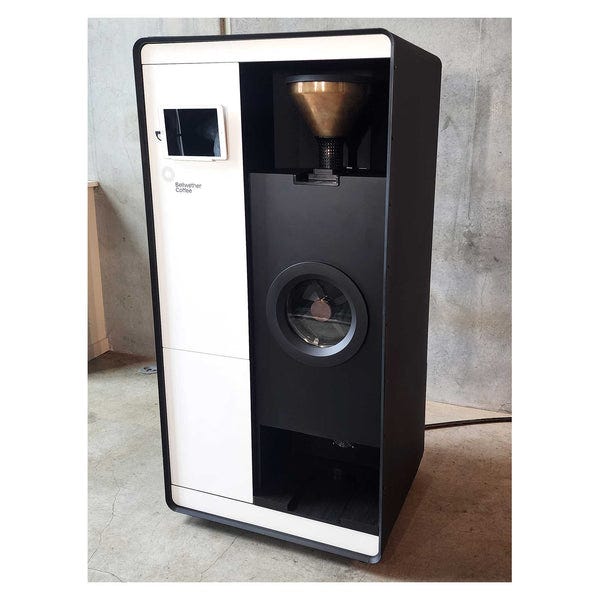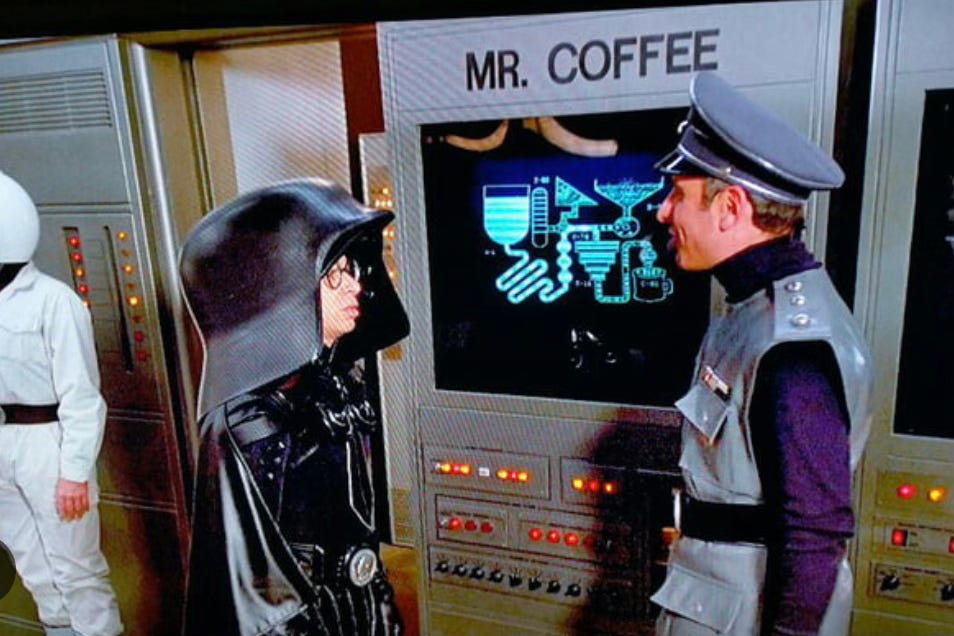Recently, a restaurateur friend invited me to check out his new coffee shop. It was the kind of subway tiled haven that instantly settles a coffee geek’s nerves—La Marzoccos gleaming on the counter, a Mahlkonig fleet hovering in the periphery, a stately pour over setup by the register. What caught my eye, however, wasn’t the slick trappings. It was a conspicuous rectangle, about six feet tall, with stenciling on its front reading, “Bellwether Coffee.” This, my friend explained, was his roaster, a Tesla-style piece of tech that automates the roast process to create instant, hassle-free coffee.
I’m tempted to say that if the Death Star had vending machines, they would look like the Bellwether, but that overstates its appeal. The rig bears more resemblance to the “Mr. Coffee” machine in Spaceballs. Its promise is simple: Anyone can roast. You need only a vaguely present mind and a quasi functional finger to create shop worthy batches. It is, the Bellwether gang insists, a revolution in convenience. And they are, the author of this Substack insists, a maladjusted band of lunatics whose talent for engineering is surpassed only by its talent for missing the point.
My friend roasted a batch for me, a Sumatra that he got from—you guessed it—Bellwether. Turns out they source coffee, too, releasing beleaguered roasters from the torment of having to taste loads of delicious brews. The Bellwether’s batch was pretty good. That’s a shame because it means we have to reckon with a reality that has been painfully obvious for a while, but distant enough for the sanguine among us to ignore.
Tech is overtaking coffee, and it’s going to change everything.
The Bellwether isn’t actually new. It’s been around since 2013. It’s also not the only techy piece of roasting gear out there. There are others that incorporate AI more thoroughly. I don’t want to seem entirely curmudgeonly about it. The Bellwhether has some great features. It’s electric, for example. It also produces zero emissions, which, considered too deeply, tangles the mind into a knot so tight as to require neurosurgical intervention. Plus, James Hoffmann seems to like it, and who am I to disagree with His Excellence The High Priest of Online Caffeination? But none of the machine’s attributes make up for its impact on roasting culture.
When I got into roasting, the allure had to do with the craft. If you’re an obsessive—and any roaster worth his/her salt is almost certainly that—turning beans from green to brown offers an unparalleled menu of targets. You get to geek out over things like drum speed, airflow, the way certain processes absorb heat, the way others resist it. The joy of roasting derives from its vastness. There is simply too much going on, too much knowledge to absorb. With study, you might get good. With enough study, you might even get great, but mastery, in the definitional sense of the word, simply isn’t possible. Which is the point. There’s value in the unknown and fulfillment in trying to know it.
This is true of other crafts, too, with the exception of lanyard making. Vintners are encyclopedic about grapes, and their efforts to create great wine amount to pursuits of a platonic ideal. When they fall short, they expand their knowledge. BBQ pit masters have, over centuries, perfected the art of assessing wood combustion, smoke, and the breakdown of collagen, and if you’ve ever waited in line for Texas BBQ, you know how worthwhile the pastime has been. Growing obsessed with something, going broke trying to master it, and somehow enjoying that process, is the most human thing imaginable. I can’t remember whether it was Hume or Kant or Miley Cyrus, but a great philosopher once said, “It’s not the mountain, it’s the climb.” Or something to that effect.
There is no climb with techy AI roasting. It is as sea level an operation as beach volleyball, and it’s far less flattering. I said earlier that the Bellwether demands little more than a functional finger, but that’s overstating things. I’m pretty sure someone with a sprain would manage just fine. I suppose you could argue that the Bellwether frees its operator to do more important things. It’s also handy for shop owners who don’t want to hire roasters, and it’s handy for roasters who don’t want to be roasters. I have a hunch that there are loads of people who fall into both categories. But for those of us who track rate of rise, environmental temperature, and development ratios, it smacks of excessive convenience.
I got into roasting because I fell in love with the drink. There was something about coffee’s fathomless flavor that hooked me. My obsession was so grand that I received coffee mug ornaments from family members at Christmas. Loving the drink made me want to know everything about it. Where did it come from? How was it made? The answers to those questions gave rise to another: Could I create it myself?
I bought a shoebox sized roaster, stuffed a dryer vent onto the end, snaked it out of my apartment’s window and smoked out the neighborhood. I roasted terrible batches more times than I can count, but I got better. I bought a more refined roaster, read every book I could get my hands on, learned data-logging, hired instructors, studied a million roast curves, and somewhere along the line I got good. How good? I don’t know. But decent enough to sell the stuff, which is a meaningful metric.
Tech is great in so many ways. AI seems poised to create an era of personalized medicine. Education is available to everyone everywhere with the click of a button. A guy like me can publish an article like this without paying a dime. It’s also not lost on me that many of the things I rely on as a roaster—temperature probes or roasting software, for example—were, at one point, techy advancements. But they didn’t aim to replace the roaster, and I worry about conveniences that do.
I’d love to hear your thoughts on tech and AI, not just in the coffee space, but in any area you find fit for discussion. Drop a comment below.





Sure, AI will change our lives. Hopefully for the best, but time will tell. There will always be demand for niche roasters of specialty coffees,but never fear, your role has been secured.
I was a certified Bellwether technician and worked on a restaurant's fleet, almost weekly. I've also installed a few V2s. It's definitely for people that don't want to be involved. Although you can source your own coffee and plot your curves, but they become very hands off. Which I find strange. There is also a very high cost of ownership. The PMs for the V1 were monthly for one client and it took 6-8 hours. The V2 shaved a few hours but you need to replace a 4ft carbon and hepa filter. Emissions have to go somewhere. Into a dumpster instead of the air. I've yet to see the much smaller V3 in person.
Also if you want to scale, your yield is 5lbs. Not very much if you want to supply more than just your shop. Then if your machine is down, and you need coffee sometimes they can't get it out to you fast enough.
Overall with AI, we can lower the bar so everyone can generate or roast whatever they want; but at the end of the day I believe most people will value human effort and craftsmanship. I also think that it will never be the magic bullet they think it can be. I also don't think we'll run into any weird sci-fi scenarios. I also don't think we're smart enough to get to go that far. At the end of the day it's all 1s and 0s. They just calculate much faster than ever.